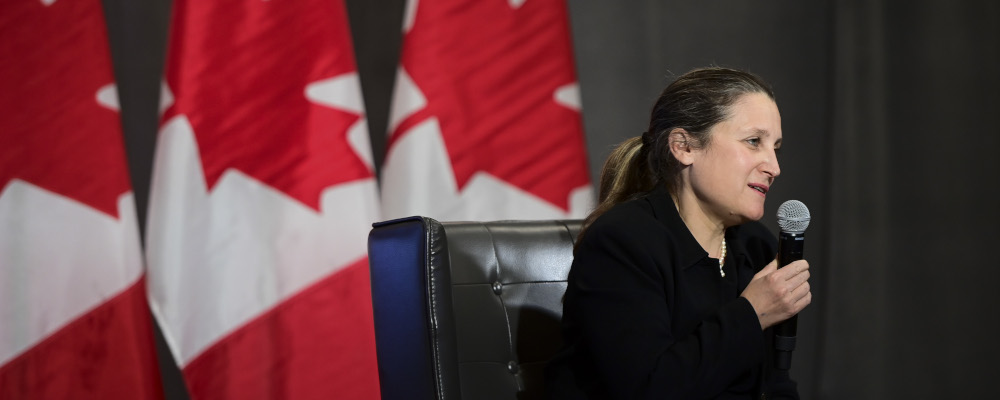Finance Minister Chrystia Freeland has been busy advocating for building back better toward a more inclusive society. Many observers lauded her recent budget for taking progressive action on child care, climate change, and Indigenous reconciliation.
Yet when it comes to the banking sector, Freeland refrained from action despite the need for reform in a critical area of the economy that has too often been slow to change.
Inaction may no longer be an option. Whether or not the government knows it, today, a brewing revolution is disrupting the global banking sector. The open banking revolution could eventually topple centuries-old business practices leaving an indelible impact on customers, financial institutions, and the global economy.
Open banking is a system in which customers may share their financial information electronically, securely, and only under conditions they approve of. Fundamentally, it is a democratization of the financial sector, providing greater financial transparency options for account holders. This secure level of “openness” allows third-party financial service providers efficient access to customer financial data from financial institutions, promoting the development of fintech apps and services that expand financial access.
More democratic? Greater fairness? Enhanced transparency? One could be forgiven for mistaking open banking as an idea lifted straight from the Liberal playbook.
Nevertheless, while the concept of open banking is seemingly sympatico with the Liberals’ progressive beliefs, Canada lags far behind the U.K., the EU, countless Asian countries, and most of our other G20 peers on implementation.
A brewing revolution is disrupting the global banking sector.
While some Canadian fintech companies are already helping ordinary Canadians better manage their finances (Wealthica), providing small businesses with cashflow (Intuit), and helping Canadians invest (Questrade), Canada’s reluctance to introduce open banking regulations stifles our chances to take full advantage of the coming fintech wave. We should aspire to multiple Wealthsimples.
What makes this hesitancy especially baffling is that a fintech boom could benefit individuals and businesses who have long been overlooked by traditional financial institutions.
For racialized and lower-income Canadians, fintech could provide greater access to a broader range of financial services and products, enabling them to participate more fully in the economy and unlocking their potential.
Fintech will also further reduce the emphasis placed on in-person banking, a move that began with the rise of online banking. While some customers still favour going into bank branches, individuals and SMEs based in remote locations have long been forced to choose a financial institution based on proximity rather than on product and service offerings. This outdated, exclusionary model no longer reflects the needs and expectations of today’s consumers.
Whether you are a rural farmer in Alberta or an Indigenous business owner in the B.C. interior, fintech will ensure you gain the same level of access, product, and service that urban Canada enjoys.
While the social benefits are impressive, the impacts of fintech on the broader economy are also profound. The spread of fintech spurs competition and innovation that ultimately improves the cost and quality of financial products available to consumers. Embracing open banking would lead to an explosion of online and mobile applications, like in the U.K.
In just the past three years, since the introduction of the Open Banking Standard, over 300 new British fintech companies have sprung up, attracting more than 2.5 million new customers. This bodes well for Canada, a country looking to attract foreign investment.
Every major Canadian city has a built-in fintech ecosystem waiting to take off.
Between a deep expertise within its financial sector, a strong regulatory environment, one of the world’s most digitally connected economies, and unbeatable proximity to the US market, investing in Canada should be a no-brainer for a foreign fintech entrepreneur. And for those already here, the benefits are even more apparent.
As a bilingual sector with thousands of thriving companies in every major Canadian city there is a built-in fintech ecosystem waiting to take off. It would be difficult to think of a stronger starting point when building a global fintech hub. And since the Big Five banks will eventually be disrupted, wouldn’t it be better if a Canadian fintech was leading the charge?
Granted, implementing an open banking system to allow for a fintech boom will not be easy. Critics offer privacy concerns, data security, and online fraud as risks. However, as we have seen with data leaks at Desjardins and Capital One, those risks are already a reality.
Trust between customers and their financial institutions develops over time through repetitively reliable transactions and an enjoyable user experience. The first step towards the acceptance of open banking in Canada will need to be a trust building exercise. Much like the maturation of online shopping over the past two decades, alleviating concerns about security will take time and will only be accomplished through proof and evidence. If anything, the urgency for action on open banking comes down to the need for smart, effective, and customer-centric regulation of the fintech space in Canada.
Recognizing the federal government’s inclination to be cautious and incremental in their approach to the issue, even modest signals would be welcome. Appointing an open banking “tsar” and creating an independent open banking entity are safe steps the government could take in the short-term. Such low-cost actions would have the added benefit of demonstrating to foreign entrepreneurs, Canadian fintech companies and the four million Canadian fintech customers that Canada will not be left behind in this fast-evolving policy sphere.
Fintech insiders suggest the next six to nine months are crucial. Without government action, Canada could see an exodus of both talent and capital. Delay will also detrimentally affect thousands of Canadians looking to bounce back post-pandemic, crying out for better financial services.
With legislative action all but ruled out between now and Parliament’s summer break, and a fall election in the offing, all eyes turn to Freeland.
In addition to building back better, will she also be up for building better banking?
Recommended for You

The Notebook by Theo Argitis: Carney’s One Big Beautiful Tax Cut, and fresh budget lessons from the U.K.

Rudyard Griffiths and Sean Speer: The fiscal hangover from the One Big Beautiful Bill hits Canada

Lucy Hargreaves: Canada needs builders, not bystanders

Need to Know: Mark Carney’s digital services tax disaster



